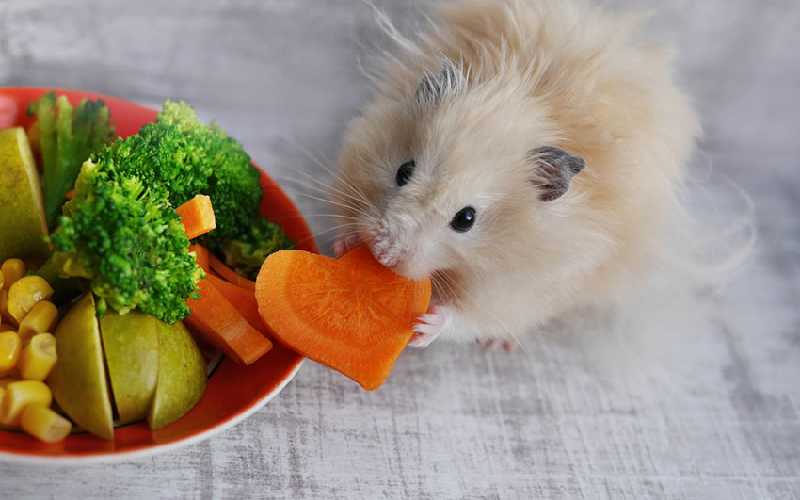hamsterhappy.co.uk is a participant in the Amazon Services LLC Associates Program and other affiliate advertising programs designed to provide a means for us to earn fees by linking to Amazon.com and affiliated sites. Affiliate links may be used on this page and in hamsterhappy.co.uk articles, but they do not impact on the price that you pay and they do help me to get this information to you for free. Read my privacy policy for more information regarding affiliates.
Administering the right type of food to a hamster is very important. There are five main types of feed for hamsters: seed mix, pellets, dried fruit and vegetables, live insects and grasses. This blog post will give you an overview of what each type entails. It also contains tips on feeding your pet hamster and other information related to the care and feeding of this adorable rodent.
Hello! I am here to talk about the importance of good diet in taking care of your furry little friend, the Hamster. You might have heard that different types of food are more appropriate for different stages in a Hamsters life cycle. Let’s say you have a baby hamster. Should you feed it the same type of food as you would feed an adult? Or maybe you have a grown up hamster. Should it be fed only dried pellets? Or should it be given the same live insects that babies prefer to eat?
Fresh Food for Hamsters
Hamsters have tiny stomachs and can only hold a small amount of food at one time. You do not want to leave your hamster with spoiled food in his cage for too long because it can make him sick or cause other health problems. Always make sure that your hamster is getting enough fresh, dry, or nutritious foods from you.
Below are 5 things that I want to share with you today about a hamsters diet. Remember, these are just some suggestions and there are still other people out there who prefer something different for their furry friend. It is best to keep your hamster as healthy as possible by providing him with a variety of food types, so he would not get tired of eating the same thing over and over again.
Things to remember:
Fresh food is better than dry food. Try to avoid processed, prepackaged foods. Hamsters should be fed a variety of different types of food items regularly throughout the day. Watch your hamster eat and remove the uneaten part of whatever it is eating as soon as possible to prevent over-feeding or spoilage. Food items containing whole grains, seeds and nuts are an essential part of a hamster’s diet. They provide fibre and energy, but they should be limited in order to avoid spoilage or the formation of mould in the cage. Hamsters should not be given foods that are spoiled or moldy.
Things to avoid:
Peanuts and peanut butter – they contain a toxin called Aflatoxin that can kill your hamster Dry millet – it contains too many carbohydrates and causes digestive difficulties such as diarrhea or constipation. Chocolate, cocoa beans, caffeine, and yeast (breads, cakes etc.) – All of these things are poisonous to hamsters.
Dairy products (milk, cheese etc.) – Hamsters lack the enzymes necessary to digest these items. They also tend to cause bloating or diarrhea.
Food items containing preservatives or artificial coloring agents – These can give your hamster stomach aches.
Sour foods – Sour fruits can cause upset stomachs and diarrhea. Fried food – Avoid foods that are fried or contain lots of grease. These, too, can make your hamster sick.
Alcohol – Some alcoholic beverages contain sugar and other ingredients that hamsters are likely to eat in excess, making them sick or causing digestive problems such as diarrhea or constipation.
Food containers – Hamsters like to chew on things in their cage and plastic is one of their favourites so make sure that any food container is not made of plastic.
Things that are okay to feed your hamster:
Grass, fresh vegetables, bread, fruits, egg yolk, small live insects such as mealworms and fruit flies. In order to keep your hamster healthy its best to feed him a mixture of different types of food. You also need to keep the freshness in mind. Try and avoid canned or prepackaged food items because they contain preservatives and other ingredients that may irritate your hamsters digestive system. Make sure that you remove uneaten food items promptly from the cage in order to prevent spoilage or the growth of bacteria in his cage. The longer time the food stays there, the more likely it is to cause health problems for your furry friend.
Quick tips:
A hamsters diet should consist of up to 50% fresh food and 50% dry food. Remember, your hamster does need to have lots of different types of food in his diet. This will provide him with the nutrients he needs to be healthy. It will keep him from becoming bored with one type of food and overeating on it. Keep an eye on how much your hamster eats at a time. You may have to remove the uneaten part after about 5 minutes so he does not become overweight or sick by eating too much at once or eating spoiled food that is left in his cage for too long.
If you found this article helpful, you might be interested in learning about Can Hamsters eat Green Beans?



1 thought on “Fresh Food for Hamsters”